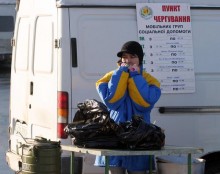Incidentally, even BMW Foundation uses the services of Bob Westfall in the United States. This gives one of America’s best-known experts on fundraising carte blanche to trot the globe for delivering lectures and exchanging experience. Mr. Westfall has visited Ukraine to take part in a seminar for the nonprofit sector and granted an interview to The Day. It is about the heart of financial donors, trends in Ukrainian charity, and fairness in relations.
What does fundraising in post-communist states mean to you?
“A generation has grown up that does not know communism. The generations that grew up under the flag of Marx’s and Engels’ ideology had almost never donated anything, for they were always given everything. Yet the generations that are unaware of the abovementioned ideologies no longer fully rely on the state. These people, who have a democratic mindset, are used to working in order to live. So I can see the following relationship: the farther the people are from the communist umbrella, the more generous they are in charity.”
What trends in the art of fundraising are noticeable in the world?
“The main trend in the world today is that we can see donors who share increasingly large amounts of money with an increasingly small number of organizations. In other words, in the previous decade philanthropists preferred to fund a much longer list of organizations than they are doing today. Secondly, it is a question of results. ‘When I donate resources and a nonprofit organization receives them, what does it exactly do with them to influence the destinies of people?’ donors ask themselves daily. This is why nonprofit organizations should focus on analyzing their results as far as changes in the quality of people’s life are concerned. The organizations that will understand this will have the highest quality of relations with the donors and will attract more money and partners.”
What data are you citing in this case?
“The ‘government’ of sponsors is stationed at the Indiana University Lilly Family School of Philanthropy (http://www.philanthropy.iupui.edu), admittedly the most prestigious charity source. Firstly, once in two years they present, together with the Bank of America, a special report that contains the empirical data I rely on. Secondly, our team [Westfall Group. – Author] is always looking in the Internet for any charity research. For example, we once came across a review that really interested us – it was a study of Asia’s third sector. It followed from it that the No.1 ‘money-giving’ city was Beijing. The agency can lay claim to being effective because we are looking for topical news and information about charity.”
What is the difference in the fundraising practices of the US and Europe, including the latter’s eastern part? What recommendations are there for the third sector?
“Clearly, the donation practice in the US is not the same as in Eastern Europe. It took the latter region almost 20 years to become aware of the need of charity. But this is something new for Eastern Europe – of course, in comparison with America, in which donation is an age-old tradition. For this reason, Eastern Europeans are only beginning to see the advantages of charity.
“It will take some time to understand which practices are suitable and which are not. In particular, Ukrainian financial donors must find the key indications that would allow judging about the effectiveness or ineffectiveness of one nonprofit organization or another.
“Another resource that is accessible in America and is not in Europe is a special managing body that reports on the effectiveness and viability of charitable organizations. It is Charity Navigator. It sets up the effectiveness indications that assess the scale of an organization’s impact. Naturally, there is nothing of the sort in Eastern Europe. I believe an analogue to this think tank will soon emerge in Ukraine, too, because the more educated the sponsors are, the more important this becomes for them.
“Another difference is the question of anonymity. US donors willingly say how much and who to they have donated. The Europeans are wary of this openness and prefer anonymity. Ukrainian nonprofit representatives should take this into account and staunchly defend the right of a sponsor to anonymity – particularly, of his personal data.”
Does America know the Catholic charitable organization Caritas?
“Sorry, I’ve never heard of it.”
What does America know then about Ukrainian nonprofit organizations and, particularly, about the way they are funded?
“I can only speak for myself (laughs). As I have been cooperating with Ukraine’s third sector since 1995, I’ve maintained contact with some of its representatives. What I am sure of is that most Ukrainian NPOs are cash-starved. They find it far more difficult to survive on small donated money. I know a lot of organizations that have launched a business to have at lease some monetary earnings. How can funds be raised for Ukrainians in Ukraine? It seems to me this item will remain on the agenda in the next five years.”
Let us imagine that the majority of Ukrainian charitable organizations in the future will not be set up by businesspeople who wish to “whitewash” their past. Let us call it a secular alternative to candle-lighting in church. How can they raise funds in a (perhaps) more competitive environment?
“In this case, seriously influencing the destinies of people should be the highest priority. Clean, honest, and sincere stories of changes in the life of people – presented with a high skill to boot – will always inspire others to join.”
Is there a correlation between the quality of NPO financial reporting and the amounts of donations in democratic societies?
“In America, people who donate a large amount of money demand a certain financial report from the donation’s recipient. They want to see either financial accounts or public money reports which are supposed to show the efficiency of a nonprofit organization’s board of trustees. Therefore, once donors in Eastern Europe and Ukraine in particular become more experienced in the field of charity, they will begin to demand financial transparency.”
What else will they be demanding?
“In the United States, about 90 percent of local donors are not against being financially involved in the activities of other philanthropists who recognize and sincerely thank their partners for help. They also report on the impact of investments. If you learn this lesson, you will be able to retain more donors, remembering that the more donors there are the greater overall funding we will receive.”
A question in the contest of financial reports: what relationship must there be between the mass media and charitable foundations?
“It is not at all necessary to publicize financial reports via the media. The media are more effective in spreading simple information about your foundation. Whenever people read or hear about your NPO, they should show enthusiasm and visit the website that comprises all the accessible financial reports.”
Ukrainian society was utterly surprised to learn that Barack Obama’s election campaign was based on multiple 59-dollar donations (http://www.huffingpost.com/2012/03/19/barack-obama-fundraising_n_1361585...). How can Ukrainian nonprofits find a way to the hearts of their compatriots? How should the culture of respect for the nonprofit sector be formed?
“A good question. Obama’s election campaign rested on the grassroots supporters: the people who donated the abovementioned amounts were 20 to 29 years old. The media also played a major role in this process, for they motivated making one’s own choice.
“In general, it was a target-oriented campaign: people were offered a simple reason why they should be donors. If you want to hold a similar campaign in Ukraine, you must have powerful multimedia channels of communications, such as the Internet and the social media. It is important for young donors so that they can spread information independently in the Internet.
“But it is difficult to invite such nonprofits as, say, universities to make ‘target-oriented’ donations. By contrast with political players, they find it much more difficult to draw the attention of donors. The same applies to child charity: you can donate 100 hryvnias a month to keep a child well-fed. So the conclusion is: the quality of a nonprofit depends on its type.”
According to the State Registration Service of Ukraine (http://www.drsu. gov.ua/show2419), there are 3,599 non-governmental organizations within the limits of Ukraine. Do you think this multitude is the sign of a civil society?
“I would not say it is a marker of something. I know that it is critically important for Ukraine that local nonprofits take part in democratic transformations. The state is unable to support each and every, It cannot offer as high-quality services as local nonprofits can [maybe, Mr. Westfall is recalling the experience of Germany which has delegated the lion’s share of social work to the nonprofit sector. – Author]. Nonprofit organizations fill the gaps which the state is unable to bridge. For this reason, I would encourage nonprofits to play the main part in the life of local communities.”
The Day’s FACT FILE
Bob Westfall was born on June 21, 1961. In 1988 he began to work at the US office of the educational organization “Walk through the Bible.” Finishing this career in 2002 as vice-president for development and foreign relations, he established the fundraising organization Westfall Group. In the course of 10 years Westfall Group has helped such nonprofit and charitable organizations as BMW Foundation, Bible League International, Oakland City University, Westmont College, Food for the Hungry, and others to raise about 306 million dollars. The main fields of Westfall Group’s activity are development of relations with medium- and high-level donors, fundraising, and event management.
Westfall resides in Suwanee, Georgia, USA. He is married: his wife Kim works as Westfall Group’s client service manager. They have four children: Britney, Jessica, Austin, and Alice.








